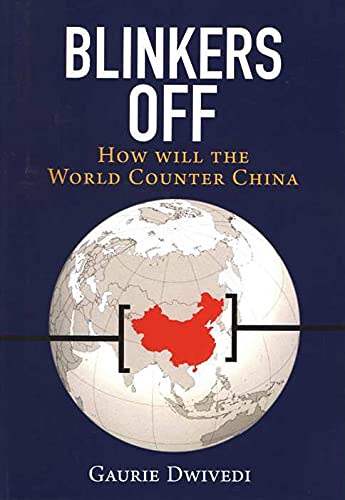‘Blinkers Off, How Will The World Counter China’ makes a case for identifying newer frontiers where the Chinese will exploit existing fault lines.
New Delhi: This review is being written at a time when there are fresh propaganda videos being released vis-a-vis India by the Communist Party of China. While the videos have been rejected for being grossly inaccurate, what the strategy clearly highlights is the changing dimensions of warfare. China is on its way to hone capacities in the “Multi-Domain Warfare” being pursued in a nebulous “Grey Zone” environment. It is no longer restricted to the military domains where the Chinese dragon was caught by its horns by the Indian soldiers, as was the case in 2020 in the Galwan Valley and before that at Doklam. Instead, information propaganda or influence operation now forms an integral component of playing “mind-games”. Just like the use of technology to create asymmetries. In addition to military warfare, it is these new domains that will possibly redefine how any escalation will take place in the next few years. Such aspects have been lucidly highlighted in a recently released book, titled “Blinkers Off, How Will The World Counter China” by senior journalist Gaurie Dwivedi. Provocatively titled, the book makes a case for identifying newer frontiers where the Chinese will exploit existing fault lines. It urges policymakers to remove their blinkers since the Chinese view all possible options as part of a single strategy aimed to pursue their geo-political objective. This includes trade, technology, more effective usage of bodies of global governance and even information campaigns, playing the Pakistan proxy and weaning away South Asian countries. China is a centuries old civilisation, but the Communist Party of China is not. Unlike the people of China who do not have any hegemonic ambitions, the Communist Party of China does. And to pursue the dream of tianxia or all under the heaven, there will be an overt and covert display of aggression. Tianxia is a vague concept around which Xi Jinping has whipped up domestic sentiment to legitimise his decision to scrap presidential term limits. As per tianxia, the world was divinely bestowed upon the Chinese emperor who was the epicentre of the world and nations were either tributaries or vassal states. Clearly, Xi Jinping is trying to create the same imagery with the BRI. The program, which is Xi’s flagship project, has been added to the Constitution. It is expected to create several vassal states like Pakistan, which is one of the eight most heavily indebted countries. To further this objective, an isolated China will not hesitate to exploit the non-military aspects of its engagement with the world. After the June 2020 conflict when India resolutely withstood the Chinese belligerence, Xi knows that an armed conflict with India will have unsavoury consequences. So, the pursuit of economic warfare and technological warfare becomes more plausible, more so since they do not evoke a strong or a concerted response from liberal democracies.
Running successful information campaigns and pursuing hard to detect cyber-attacks are two areas where the Chinese will increasingly focus on. It is not a mere coincidence that China does not allow the use of free internet for its own citizens but uses the same platforms to run campaigns against other countries. It is by design since Beijing views this to be another aspect of pursuing its strategy to become the world’s hegemon. While propaganda videos have no takers, they play a role in building narratives and also shape opinion. Likewise, cyber-attacks are low grade methods of causing disproportionate impact to adversaries—from bringing down telecom networks to damaging rail systems. Ms Dwivedi points out that there are now sophisticated cyber armies that carry out attacks targeting vital economic infrastructure. Compounding matters, these armies are run by entities or individuals that cannot be easily linked to a particular country. Real time and collective response is just part of the solution. The book provides areas in which deterrence can be built against cyber-attacks.
Besides technology, the book also gives instances where China has successfully used its economic muscle against smaller economies like Norway, South Korea, and most recently Australia, which sought an independent inquiry into the origins of Covid-19. These show the need to respond in the same coin to China’s economic aggression. Large economies like the US and India, which run trade deficits with China, can counter these tactics if the Quad as a mechanism evaluates economic possibilities of isolating Beijing. Quad, which has the potential to act as a counter to China’s overreach in the Indo Pacific, has mentioned alternative supply chains as a possibility. It is time to act on this intent. “Blinkers Off” provides a fresh perspective on dealing with China, outside the realm of zero-sum conflicts. In non-military warfare, there are clear winners. In 2022, China may not be one of them.
Maj Gen B.K. Sharma (Retd) is Director, United Service Institution of India.

